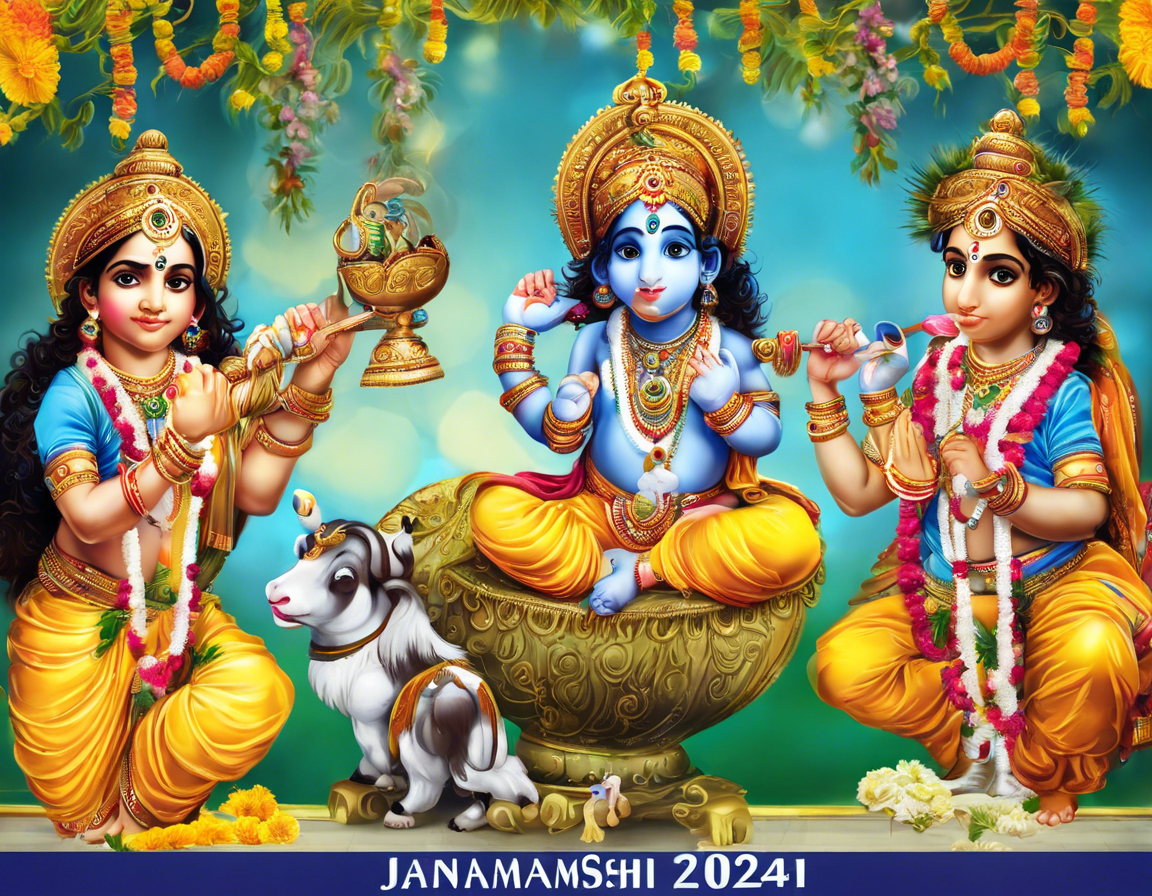Introduction
Janmashtami, also known as Krishna Janmashtami, is a Hindu festival that celebrates the birth of Lord Krishna, an incarnation of the Hindu deity Vishnu. This festive occasion is observed with great enthusiasm and grandeur by millions of devotees around the world. Janmashtami falls on the eighth day (Ashtami) of the dark fortnight in the Hindu month of Bhadrapada, usually in August or September according to the Gregorian calendar. In 2023, Janmashtami will fall on August 11th.
History and Significance
According to Hindu mythology, Lord Krishna was born in Mathura to Devaki and Vasudeva. He is known for his divine teachings in the Bhagavad Gita and his mischievous yet endearing demeanor as a child in Vrindavan. The celebration of Janmashtami is a way for devotees to honor and remember the life and teachings of Lord Krishna. The festival symbolizes the victory of good over evil and reminds people to uphold righteousness in their lives.
Preparations for Janmashtami
Preparations for Janmashtami usually begin weeks in advance. Homes and temples are decorated with flowers, lights, and traditional motifs. Devotees observe fasts and engage in devotional practices such as bhajans (sacred songs) and kirtans (musical recitations) leading up to the day of the festival. Many devotees also participate in community events and temple ceremonies.
Rituals and Traditions
On the day of Janmashtami, devotees observe a day-long fast, breaking it only at midnight when Lord Krishna is believed to have been born. Special prayers are offered, and the sound of conch shells and ringing bells fill the air. Temples are beautifully decorated, and idols of Lord Krishna are adorned with new clothes and jewelry. The midnight hour is the highlight of the celebrations, with devotees singing hymns and engaging in joyous revelry.
Dahi Handi Celebrations
One of the most popular traditions associated with Janmashtami is the Dahi Handi celebration. This ritual reenacts a playful incident from Lord Krishna’s childhood where he and his friends would form human pyramids to break pots of butter suspended from the ceiling. In modern times, young men (called Govindas) form human pyramids to reach and break a pot filled with curd, milk, and butter, which is hung at a lofty height. This activity symbolizes unity, teamwork, and the spirit of camaraderie.
Food and Offerings
Special dishes are prepared as offerings to Lord Krishna, such as his favorite Makhan Misri (butter and rock sugar) along with fruits, nuts, and sweets. Devotees break their fast at midnight with a feast known as the ‘Prasad’ which includes a variety of dishes. Some popular delicacies prepared for Janmashtami include Panjiri, Kheer, Peda, and Chappan Bhog (a platter of 56 items).
Devotional Activities
Devotees engage in various devotional activities on Janmashtami, such as reciting bhajans, chanting mantras, and performing aarti (a ritual of worshipping the deity with lighted lamps). Many temples organize special programs like plays depicting episodes from Lord Krishna’s life, spiritual discourses, and cultural performances. These activities create a spiritual ambiance and foster a sense of unity and devotion among the participants.
Significance of Fasting
Fasting on Janmashtami is considered a way to purify the body and mind, enhance spiritual awareness, and express devotion to Lord Krishna. It is believed that fasting helps in focusing the mind on spiritual pursuits and developing self-discipline. Fasting also symbolizes austerity and detachment from material desires, encouraging individuals to seek higher truths and spiritual fulfillment.
FAQs:
- What is the significance of celebrating Janmashtami?
-
Janmashtami celebrates the birth of Lord Krishna and symbolizes the victory of good over evil. It is a time for devotees to remember and honor the teachings of Lord Krishna.
-
How is Janmashtami celebrated in different regions of India?
-
Janmashtami is celebrated with unique customs and rituals in various regions of India. In Mathura and Vrindavan, the birthplace and childhood abode of Lord Krishna, the celebrations are especially grand and elaborate.
-
Can people of other faiths participate in Janmashtami celebrations?
-
Yes, people of all faiths are welcome to join in the celebrations of Janmashtami. The festival promotes unity, love, and harmony among individuals of diverse backgrounds.
-
What are some traditional dishes prepared for Janmashtami?
-
Some traditional dishes prepared for Janmashtami include Makhan Misri, Panjiri, Kheer, Peda, and Chappan Bhog.
-
Why is Dahi Handi celebrated on Janmashtami?
-
Dahi Handi is celebrated to commemorate Lord Krishna’s playful activities as a child. It signifies unity, teamwork, and the spirit of camaraderie.
-
How can one observe Janmashtami at home?
-
Individuals can observe Janmashtami at home by decorating a small shrine with images or idols of Lord Krishna, reciting bhajans, chanting mantras, offering prayers, and performing aarti.
-
Are there any specific prayers or mantras recited on Janmashtami?
-
Yes, devotees recite prayers like the Vishnu Sahasranama, the Hare Krishna mantra, and various stotras dedicated to Lord Krishna on Janmashtami.
-
What is the significance of breaking the fast at midnight on Janmashtami?
-
Breaking the fast at midnight symbolizes the moment of Lord Krishna’s birth. It is believed to be an auspicious time when devotees offer prayers and partake in the blessed feast.
-
How long is the fasting period for Janmashtami?
-
Devotees can choose to fast for the entire day leading up to midnight or observe partial fasting by consuming fruits, milk, and light meals.
-
Can one participate in Janmashtami celebrations online?
- Yes, many temples and organizations livestream Janmashtami celebrations, allowing people to participate virtually and be a part of the festivities from anywhere in the world.
Conclusion
Janmashtami is a joyous occasion that unites devotees in their love and devotion to Lord Krishna. The festival’s vibrant celebrations, devotional activities, and traditional rituals create a spiritual atmosphere filled with enthusiasm and reverence. By understanding the history, significance, and customs of Janmashtami, participants can fully immerse themselves in the festivities and experience the divine presence of Lord Krishna in their hearts.
